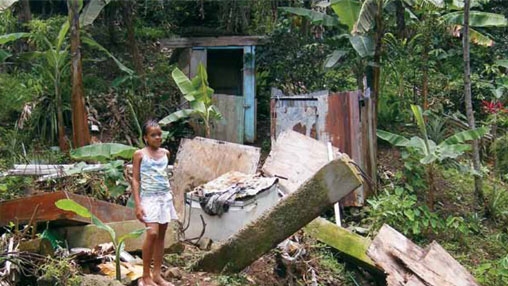In Dominica the intense rainfall arrived after an unusual dry season, and the combination of cracks in the soil and torrential rains triggered landslides and slope failures, causing major damage to roads, bridges, houses and agricultural land.
In just a few hours, the strong winds and rains destroyed critical infrastructure that took the small nation of about 70,000 people more than five years of normal investment for the country.
The total damage and loss was estimated at US$483 million, equivalent to 90 percent of Dominica’s Gross Domestic Product (GDP), according to the rapid damage and impact assessment conducted by the government of the Commonwealth of Dominica in collaboration with the World Bank, UN, and other development partners with funding support from the EU and the World Bank Global Facility for Disaster Reduction and Recovery.
The event took place just two months ago and killed 11 people, cutting off electricity and water supply on the island and closing down the airport. For a small economy, recently bolstered by a recovery of the tourism sector in the region, this represents a major economic set back.
Small and threatened
More and more, small island states such as Dominica are being confronted with extreme weather events. Many scientists are attributing the increase in the number and strength of hurricanes and storms to global warming.
According to the World Bank study “Turn Down the Heat,” the number of severe hurricanes is projected to increase by 40 percent, with double the intensity of the current, as warming rises by 2°C and up to 80 percent in case of a 4°C warming. This, together with sea-level rise, will have devastating impacts, especially on the Caribbean.
Increasing exposure to natural disasters represents a real threat to development prospects in the Caribbean. This has become the top priority for Caribbean governments that are participating in the international climate negotiations in the lead-up to the COP 21 Paris conference at the end of the month. It is also at the heart of the countries’ development planning supported by development partners.
An earlier study from the Caribbean Catastrophic Risk Insurance Facility (CCRIF) showed that annual expected losses from wind, storm surge and inland flooding amount to up to 6 percent of GDP in some countries. Climate change has the potential to greatly exacerbate these risks, and could increase expected losses by 1 – 3 percent of GDP by 2030.
Dominica calls for help
As Dominica sets its priorities for recovery and reconstruction, the focus is now on building climate resilient infrastructure and preparing investments to reduce flooding and landslide risks. This also means being better prepared with a trained crisis response team and early warning systems in place, but also establishing a broad based catastrophe risk financing strategy to provide insurance and help the most vulnerable protect their livelihood against extreme weather events.
Last week, the government of the Commonwealth of Dominica organized a pledging conference with donors to garner additional support to help shore up the island and preserve the hard-won socio economic gains achieved over the last decade.
Following the conference, Prime Minister Skerrit said, “We believe that it is not only about cutting roads, building houses and giving somebody a key…. I’ll be the first to say, as I’ve said before, that we do not have the requisite expertise on the island to guide us in that direction therefore we are relying heavily on our partners all of whom have indicated their keen interest and intention to provide us with that level of support and guidance.”
These are common goals shared by many small island countries in the region. Now the question is whether the Paris agreement will provide additional instruments to respond to the growing threat of climate change in the Caribbean.

